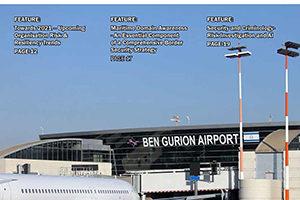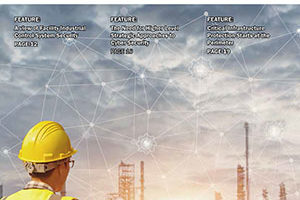Latest issue of World Security Report has arrived


News from IACIPP



The International Association of Critical Infrastructure Protection Professionals (IACIPP) is delighted to announce the appointment of Brian Harrell as Strategic Advisor to the Board.
In 2018 Brian was appointed by the President of the United States to serve as the sixth Assistant Secretary for Infrastructure Protection, at the Department of Homeland Security. He also served as the first Assistant Director for Infrastructure Security at the U.S. Cybersecurity and Infrastructure Security Agency (CISA).
Brian currently serves as the Vice President and Chief Security Officer (CSO) at AVANGRID, an energy company with assets and operations in 24 states. He is responsible for the companies physical and cybersecurity, security compliance, enterprise risk governance, and fire protection units.
His breadth of experience spanning both the private sector and his involvement at the highest levels of governmental/policy positions will no doubt add great value to our Association.
Brian is nationally recognized for his efforts on critical infrastructure protection, continuity of operations, and enterprise risk management. Advising corporations throughout North America, Brian has worked to increase physical and cybersecurity mitigation measures designed to deter, detect, and defend critical systems.
Brian is also a Senior Fellow at Auburn University, McCrary Institute For Cyber and Critical Infrastructure Security where he serves as an advisor on infrastructure protection and cybersecurity policy initiatives.
Brian has spent time during his career in the US Marine Corps and various private sector agencies with the goal of protecting the United States from security threats.
John Donlon QPM, Chairman of the IACIPP said, “I am delighted that Brian has accepted the position as Strategic Advisor with us. He has a wealth of experience both as a security practitioner and in an oversight capacity, so will be a tremendous asset to the and the global CNI community. “
“The IACIPP continues to welcome new members who share the desire to engage with likeminded individuals seeking to enhance the protection and resilience of infrastructure across the globe.” Concluded Mr Donlon.
Membership is open to government agencies and operators, so if you would like to become a part of our organisation, you can register at: http://www.cipre-expo.com/iacipp-registration
Critical Infrastructure Protection and Resilience North America (CIPRNA) has announced its rescheduled dates of 19th-21st October 2021 in New Orleans, USA, with the support of Infragard Louisiana.
Postponed due to the Covid-19 pandemic CIPRNA will reconvene in New Orleans in October 2021 to continue the important discussions for governments, agencies, operator/owners and stakeholders for collaboration in securing and protecting America's critical infrastructure, and are currently inviting abstracts for consideration for presentation in the programme.
CIPRNA is the premier conference discussion for securing North America's critical infrastructure.
Further details at www.ciprna-expo.com
In the modern age of urbanization, the mass population is becoming progressively reliant on technical infrastructures. These industrial buildings provide integral services to the general public including the delivery of energy, information and communication technologies, and maintenance of transport networks. The safety and security of these structures is crucial as new threats are continually emerging.
Safety and Security Issues in Technical Infrastructures is a pivotal reference source that provides vital research on the modernization of occupational security and safety practices within information technology-driven buildings. While highlighting topics such as explosion process safety, nanotechnology, and infrastructural risk analysis, this publication explores current risks and uncertainties and the raising of comprehensive awareness for experts in this field. This book is ideally designed for security managers, safety personnel, civil engineers, architects, researchers, construction professionals, strategists, educators, material scientists, property owners, and students.
Safety and Security Issues in Technical Infrastructures edited by: David Rehak (VSB – Technical University of Ostrava, Czech Republic), Ales Bernatik (VSB – Technical University of Ostrava, Czech Republic), Zdenek Dvorak (University of Zilina, Slovakia) and Martin Hromada (Tomas Bata University in Zlin, Czech Republic).
IACIPP has contributed the Foreward to this new book.

Further details can be viewed at:
https://www.igi-global.com/book/safety-security-issues-technical-infrastructures/239916

Dr Bill Bailey, BA(Hons) MA, MCIL, PhD, Regional Director Australasia for the International Association of Critical Infrastructure Protection Processionals (IACIPP) and Adjunct Senior Lecturer, Edith Cowan University, Security Research Centre, Perth, Australia, will be presenting on 'PROTECTING CRITICAL INFASTRUCTURE: HOW TO USE A PROACTIVE SECURITY MANAGEMENT PROCESS TO ACHIEVE SUSTAINABLE RISK' at the 2019 Risk & Resilience Asia Conference in Singapore on 28th-30th August.
The protection of critical infrastructure assets is vital to every government, organisation, business and person. If the asset forms part of the essential critical infrastructure, then the loss can be catastrophic and far reaching with considerable national consequences. To avoid such damaging outcomes, requires a wide range of in-built security planning, structures, and operating procedures. A solution is to use a more adaptive, proactive, comprehensive security management process to: prevent, detect, deter, respond and defeat potential damaging events and incidents. Core to this security planning is a full understanding of the potential consequences of worst-case-scenarios as well as implementing a multi-layered intelligence gathering capabilities. Adopting a process driven model is a more proactive approach and grounded upon current operational procedures used by major international companies in hostile and dangerous environments. By utilizing such a clearly defined comprehensive risk management tool, a more systematic security, threat, risk and vulnerability assessment (STRVA), process can be developed.
The Honorable Judge William H. Webster has been presented with Lifetime Achievement award by the International Association of Critical Infrastructure Protection Professionals (IACIPP)
The award recognises his incredible service, not only to his country but to the global security community. Chairman of the IACIPP, John Donlon QPM, said “There can be few more deserving candidates for this Award and it is our honour to recognise his achievements and service.”
 The Award was presented on behalf of the IACIPP by Mr Jeff Gaynor, CIPRNA Conference Committee Member.
The Award was presented on behalf of the IACIPP by Mr Jeff Gaynor, CIPRNA Conference Committee Member.
Judge Webster is a former Director of the Federal Bureau of Investigation, the Central Intelligence Agency and the United States Intelligence Community and Chairman, Homeland Security Advisory Council. He continues to serve America as the Chairman of the Homeland Security Advisory Council, U.S. Department of Homeland Security.
Judge Webster, proclaimed by Governor Tom Ridge the First Secretary of the U.S. Department of Homeland Security “A National Treasure,” was born on March 6, 1923, in St. Louis, Missouri. Judge Webster was awarded his Bachelor of Arts degree from Amherst College and received a Juris Doctor degree from Washington University in 1949. Judge Webster served as a United States Navy Lieutenant during World War II and the Korean War. A practicing attorney from 1949 to 1959, in 1960, Judge Webster became the United States Attorney for the Eastern District of Missouri and from 1964 to 1969 was a member of the Missouri Board of Law Examiners. In 1970 Judge Webster was elevated to the United States Court of Appeals for the Eighth Circuit.
In February 1978, Judge Webster was appointed by President Jimmy Carter as Director of the Federal Bureau of Investigation. Appointed by President Ronald Reagan, from May 1978 to August 1991 Judge Webster served as the Director of the Central Intelligence Agency and the Director, U.S. Intelligence Community. Judge Webster is the only person in U. S. History to serve in all three of these National Security positions. Upon his retirement from Federal service in 1991, Judge Webster practiced law in the Washington, DC offices of Milbank, Tweed, Hadley & McCloy, LLP. He has maintained an office there since his retirement.
In August 2005, Judge Webster was appointed by President George W. Bush as Chairman of the Homeland Security Advisory Council (HSAC). With the cascading consequences of the long-anticipated failure of the New Orleans Levee System still being inflicted, Judge Webster spearheaded an HSAC study into the adequacy of U.S. Critical Infrastructure Protection policies and programs. In January 2006, the HSAC’s “Report of the Critical Infrastructure Task Force” made public its principal recommendation: “Promulgate Critical Infrastructure Resilience as the top-level strategic objective — the desired outcome to drive national policy and planning.” The HSAC’s subsequent June 2011 “Community Resilience Task Force Recommendations” provided the vision and means to operationalize resilience in communities throughout America.
Judge Webster holds 18 honorary degrees and Doctorates and in further recognition of his singularly unique service to the Nation and among his many awards, Judge Webster is the recipient of the Presidential Medal of Freedom; the Distinguished Intelligence Medal; and the National Security Medal. In August 2017, the National Spy Museum presented to Former President George H. W. Bush The Honorable William H. Webster Distinguished Service Award.
Judge Webster was married to the late Drusilla Lane Webster for 34 years and is the father of three children. In 1990, Judge Webster married Lynda Clugston. Residing in the Washington, DC area, they enjoy seven grandchildren, a golden retriever, a tabby cat and three horses.

With respect to the significance of cyber defence of energy sector, with the support of NATO Science for Peace and Security Program, a five-day course was conducted in Ukraine under the hosting of the Ukrainian institute of Center for Security and Defence Studies (CSDS) with the partnership of the Institute for Security and Safety, Brandenburg University of Applied Sciences based in Germany. As being a part of the organizational committee, IACIPP also supported the event.
The Association's Caspian and MENA Region Director, Ayhan Gücüyener, participated the event as a lecturer and present on the "Cyber Defence in the Energy Security Context: Understanding the Vulnerabilities, Taking the Actions".
In a modern World of rapid technological changes it is an existential matter for every nation to strengthen its cyber defence. In addition, in case of a broad and sophisticated cyber attack targeting our vital critical infrastructures, the result would be catastrophic. In a rapidly digitalized world our telecommunication networks, water systems and energy infrastructures are becoming more and more vulnerable to cyber threats. However, among those, energy infrastructures are the most favourite target for hackers who know well that a big black out could cause a massive chaos and create a significant economic damage.
As a result, cyber vulnerabilities of energy infrastructures emerges as a crucial topic. The high significance of cyber defence for energy security is caused by twofold reasons. On the one hand, there is strong dependence of economy and society from energy sector. On another hand, there is an increasing trend of sophisticated cyber-attacks directed on energy companies and particular facilities all around the globe. Therefore, cyber security should be precisely considered beside physical protection that was dominated in last century, and comprehensive approach of cyber-physical protection should be implemented on critical infrastructure facilities.


Earlier this month the UN Security Council urged joint measures to protect ‘critical infrastructure’ from terrorist attacks
Given the importance of critical infrastructure for a country’s prosperity and security and against the backdrop of increasingly diverse physical and cyber threats from terrorist groups, the United Nations Security Council underlined the need for international collaboration – both domestically and across borders – to ensure their protection.
In a resolution adopted unanimously the 15-member Security Council reiterated “the need to strengthen efforts to improve security and protection of particularly vulnerable targets, such as infrastructure and public places.”
Attacks against objects and sectors such as banking and finance, telecommunications, emergency services, air, maritime and rail transportation, and energy and water supply – perceived as ‘attractive targets’ for terrorist groups – can result not only in civilian casualties, but also damage property on a large scale, disrupt proper functioning of public services, and create chaos in societies.
It called upon UN Member States “to share information […] to prevent, protect, mitigate, investigate, respond to and recover from damage from terrorist attacks on critical infrastructure facilities, including through joint training, and use or establishment of relevant communication or emergency warning networks.”
In response to this call to action the International Association of Critical Infrastructure Protection Professionals (IACIPP) has today announced the launch of the www.IACIPP.net a global extranet designed for critical infrastructure professionals to share information with other members, keep up-to-date with the latest threats, best practise, training opportunities and much more.
Chairman of the IACIPP John Donlon QPM, FSI said “We fully endorse the UN resolution and we have already been working hard to do our part to make that aspiration a reality. The extranet is now live and operational for members. The association is open to all CIP professionals including operator site managers, security officers as well as first responders, government agency officials, officers and policy makers. Membership of the association is still free and we encourage colleagues around the world to join us.”
He went on to say: “We look forward to welcoming new members and will be demonstrating the www.IACIPP.net platform for the first time at the Critical Infrastructure Protection and Resilience, Europe conference and expo in The Hague from the 9th to 11th May 2017, where CIP professionals from across Europe and beyond will gather once again to discuss the burning issues.”